#but understanding that characters are tools in a story is like. basic stuff. VERY basic stuff
Explore tagged Tumblr posts
Text
randomly hit with just how. strange. it really is that general discussion of fictional characters treats them as like... people, who's actions have consequences in the real world or who's writers put them through real situations
#i watched a video once from a very young creator (bless her)#and i could tell from the way she talked about her characters that this shift has happened. and im not sure why?#she described giving one character a dark backstory as 'giving them trauma'#specifically the word trauma. and i could infer from her phrasing and parlance that this type of language is likely common#and i saw someone send an ask to a blog about a comic book character today... asking the user if they felt the writers of said book#were putting the character through too many traumatic situations#without any real concern for like.... how that contributes to the story. bc at the end of the day characters are vehicle for plot#even in a 'character driven' story. hell ESPECIALLY so#the reverse of this of course is people who like... categorically hate villains or cannot conceive of a protagonist doing bad things#it's just strange. and i have to wonder when how and why this happened#im not saying someone should have to have a degree in literature to provide analysis or write stories heaven forbid#but understanding that characters are tools in a story is like. basic stuff. VERY basic stuff#this is less a complaint and more a.... a lament i suppose#jonnie's thoughts
6 notes
·
View notes
Text
MYTHS VS HELLENIC POLYTHEISM : What’s the difference? What to actually look out for?


I’m going to start this blog off very blunt at first and then I’m going to dive deeper in, first off:
Mythology ≠ Religion.
That’s as blunt as I can actually get. Now, to dive in deeper,

“How are they different?”
Well, we first need to take a look at the actual definition of mythology.

See how it says “exaggerated”? Yeah, exactly. Myths are a collection of stories that are often made over the top and fictitious to often serve as a “moral of the story” and a lesson to people reading them, to show aspects of humans and how their live and act and what their ethics are. How does that work? Well, usually when you read myths (I’m going to put the story of Icarus here because it’s the most famous one), they tend to deliver a certain message to the reader, for example with the Greek myth Icarus who got too close to the sun despite the warnings given to him, depict a lesson on the consequences of not listening to someone/disobeying. Usually, it just serves and life lessons and are NOT supposed to be taken so literally. Like no, you aren’t gonna make wings and fly up to the sky and fall in a LITERAL sense…
You can take Alaska Native story telling as a reference who use these stories to teach the community, or serve as lessons for their heritage. (Or in my culture what we have is called “Zārb Ol-Māssāl” which are a series of poems or stories that tend to deliver a message to the reader on their actions.)
The whole point of myths is to tell a story in hopes that the reader or people passing down these stories will understand them on a deeper level instead of looking at it in a literal and surface sense. It allows people to connect with these stories on different aspects like love, loss, grief, etc… and to use them to create a path to share these stories with future generations. Believe it or not, myths actually serve as a powerful tool to keeping a culture alive. Why do you think Greek myths and Nordic myths are so popular?

Now, here comes the question on,
“Well why is it so bad to take these myths literally when it comes to religion? Aren’t they stories from these religions?”
Myths - although do share a purpose to aspire and teach - become way too mixed with the concept of religion at times and messes up the whole narrative. And in Hellenic Polytheism, it’s very VERY common for non-HelPols to mutter a “But Zeus was a 🍇ist!” Here or a “Hades kidnapped Persephone!” There. And this can be VERY damaging to the religion as a whole.
Now say it with me:
The gods are NOT their Myths.
Read that again. It’s exactly what’s written there.
During these myths, the gods are depicted more as characters instead of spiritual and natural beings. Think of the gods not as people, but as energy. A force of nature like spirits. Shoving these energy forces into a corner and labelling them as this and that is extremely disrespectful because you’re just throwing their spiritual depth away like it’s a cartoon show. The gods aren’t your characters you can headcanon. They’re actually forces of nature.
Most literal readings use the myths as a way to corner people who genuinely practice this stuff and force them to explain the “cheating” and “affairs” that they’ve seen from these stories, which creates a stigma around these people to explain themselves and it makes them view this practice as absurd and disgusting. What’s even worse is that the myths usually make people completely block the theological interpretation and place the gods as being only this and that. Hellenic Polytheism is a RECONSTRUCTED religion. Say it with me now:
RE. CON. STRUC. TED.
Which means it has evolved through studies and modern day practice. Basically let’s say back then the Greeks had their temples to worship the gods but now, modern day HelPols don’t actually HAVE those huge temples to go to since most are destroyed, so we make our own small, roomy altars for the gods since we have no other choice. Get my point?
And not to mention, most people who name Hellenic Polytheism as an absurd religion full of people who defend 🍇, are often conditioned by Abrahamic religions and use THEIR teachings into Polytheistic religions like Hellenic Polytheism. In Abrahamic religions, most stories are actually taken literally and seriously so when you see myths from another religion trying to tell you about the consequences your actions have on yourself and others and it’s not ACTUALLY what the text LITERALLY says then they lose their shit. These misinterpretations can often lead to memes and pop culture references that are harmful stereotypes for a VERY REAL religion
(Cough cough looks at Lore Olympus COUGHHHHHHHH)
So yeah, generally not so good.

But then you must be asking:
“If they’re all myths, then how are the gods related? How is Apollo the son of Zeus if it’s just a myth?”
Great question! And I’m here to explain the concept of “branches” to you.
Let’s place Zeus and Apollo as a point here. Who is Zeus? Well, Zeus is the “Sky Father” of Olympus. He is often seen as the highest order of the Olympians. What about Apollo? Well, Apollo being his “son” often shares the divine authority with him for example with music and prophecy and the sun. Which can all also be traced back to Zeus like an archetype relationship, like a branch. They share things in common and cosmic functions to be connected to each other on a more spiritual basis rather than “blood”.
You can also see them as metaphors! Like how Zeus is Apollos “father”. But what they really mean by this would be something like:
Zeus is … -> order and kingship. A divine authority.
Apollo is -> prophecy and light. Shares a piece of that divine authority with Zeus.
It’s a symbolism. And not only does Hellenic Polytheism use this but other systems like Egyptian, Norse, Hindu, etc… use these as well to connect divine authority and spiritual power.
Yes the gods are “related” but not in the way us humans actually think of when the word “related” comes to mind. It’s more of a spiritual thing connected by forces of nature.
Have a wonderful rest of your day. 🤞🏻
#hellenic polytheism#greek mythology#greek gods#mythology#difference#no like seriously stop mixing myth with religion#greek deities#hellenic deities#paganism#hellenic pagan#hermes#myth
337 notes
·
View notes
Text
Japanese website Forest Page is shutting down ~today, a tragic loss of "Heisei otaku memories", as so many are calling it. Launched in 2003, Forest Page was a "Geocities for mobile", a site that hosted user-created websites and gave them tools to allow non-coders to make them. In practice, it became one of the premiere places for fanfiction in Japan, with the stories hosted on author-created sites.
It wasn't quite the Fanfic.net of Japan, as for one the Japanese fandom just never centralized quite the way the 2000's western one did, instead being spread out over a half dozen or so sites. But additionally, it wasn't initially popular for fanfic so much as cell phone fanfiction, because in 2000's Japan the "cell phone novel" was a specific thing. These websites were being made for flip phones, not smartphones, and not only would people read them on those phones, they would often write them. None of that was very conducive to the creation and consumption of a "traditional" novel; so starting in the 2000's Japanese writers started making stories fit for the medium, namely:
Very short
A huge focus on dialogue and inner thoughts, with no/minimal description or scene detail
Using a limited POV of a specific character
Often employing the medium-as-message, like using emojis, structuring the story as IM's or emails, etc.
Also they all had huge gaps between lines, I'm not really sure what that is about:

Probably for readability on the phone given the small screen size? But it was absolutely part of the genre. A few of these novels actually made it big, got movie adaptations, people wrote articles about the "cultural phenomenon", it was the 2000's so Hiroki Azuma had a take on it of course, and so on. It slotted neatly into the vibe of the time of technology changing culture, paralleling discourse around otaku in the same era.
In fanfic those trends met up, and anyone familiar with fanfiction probably read that list of traits of the cellphone novel and thought "oh, this is perfect for fanfiction". Skipping out on description? I don't need it, I know what they look like already. Focus on conversation and POV? Perfect for shipping fics. Short lengths? Yeah, we are shortcutting to the good stuff, that is the point. Mirroring trends in the west, Forest Page's userbase was ~95% female, and the most common content on the site was romantic or edgy-dramatic stories in the franchises you'd expect. The closure page linked above actually summarizes the site's history by year, and lists the biggest fandoms:

Which is exactly what I would expect from a female otaku fanfiction website. Congrats to Pirates of the Caribbean for making it though, freeaboo's represent.
I do think the fact that the site was a website hoster as opposed to a fic hoster did align with the way the Japanese fandom was more "creator focused" and embraced the media mix more. There were "fic circles" a la doujin circles who made their own pages, people would make fanart, fan video games, and so own to host alongside it, and all of it was centralized to the creator; it made following them-as-a-person just a little bit easier. Most websites were simple text, but others did have the full Geocities experience:

Something that was somewhat common were basic visual novel concepts where the reader could make choices, or even insert their own name so they would be the "MC" of the story:

(Dream novels are in fact their own thing in Japan) My understanding is the site was quite popular through the 2000's and into the 2010's, though over time the "cellphone novel" as a concept fizzled out. People got smartphones, more people got PCs, and the constraints didn't make sense anymore - you can read ebooks and normal websites on your phone now after all. You can probably draw a line between these kind of stories and the webfiction/light novel boom of the late 2000's/2010's, something that was equally born on the internet, that streamlines the novel to "shortcut to the good stuff" but without the need to fit on a flip phone's screen. Though I will admit my own understanding of their histories shows them more as two sides of the same "youth demand for new literature" coin.
In 2017 Forest Page launched Forest Page Plus, a new service fully optimized for the smartphone era; but it did not transfer over all the old content, starting the clock ticking on the original Forest Page. My understanding is that in June they announced Forest Page was officially closing down; and from what I have gathered from reminiscing writers on twitter, they did not provide any easy, one-touch way to save any of the content, so people are archiving Wayback Machine links or sharing tips on how screenshot-save stories (I think the rub is they gave people a way to transfer content to FP+, but most don't want to do that, as places like Twitter & Pixiv are the content kings of this era).
As of tomorrow I would bet the large majority of the content will be gone; quite sad given both the quantity of stories there and how many got sometimes millions of readers. I am sure most of the biggest stories are archived at least, but particularly the early stuff was a very ephemeral genre, one that doesn't make sense to revisit once you aren't a 16 year old teen writing and reading fics on a flip phone in between classes. Which means another legion of the ghosts of the Wired is being born today. May we pour one out for a fellow online community that lived and died!
#forest page#otaku history#history of the internet#If some group did do a big archiving of the site that would be great to learn - I don't claim to be an expert on the site or anything
131 notes
·
View notes
Note
Sorry if this question rubs you the wrong way, but wouldn't going out of their way to try to help villains to the absolute extreme that you propose be a bit suicidal? I feel like trying to talk no jutsu criminals like Moonfish who's a serial killing canibal, or Muscular who doesn't have any actual reason for commiting violence against others other than he enjoys it, would end up getting people hurt or worse.
Idk, maybe my perception is skewed because my country has problems with the justice system being too lenient with criminals, but then striking hard against honest folk.
Like, let's say heroes try to talk to Muscular about his feelings and stuff, and he just beats them to death. So should they arrest him and take him to jail now, or should they respond "understandable, have a nice day" and let him carry on with his rampage and try to talk no jutsu him the next day?
I’ve had enough exchanges with you, rvg, to assume you don’t mean it this way, but I gotta say, this is an incredibly fallacious way to frame the “talk to Villains” discussion. I wrote two responses to this, first a characteristically long and rambly response which you and anyone else who’s interested are free to read below the cut. The second response is much shorter and is here above the cut, if only for those readers who think it’s a waste of time to try and give a sincere answer to what reads like deliberate reductiveness—though again, I don’t think that’s your intent.
Here is my model version of how Heroes should engage with Villains:
Step One: Heroes should put in a basic, good faith effort to defuse and de-escalate every Villain encounter they have with the tools and knowledge they have available; the ideal result is that the Villain will choose on their own to stop presenting a danger to the public.
Step Two: If that is not feasible for some reason, or if it is ineffective, then the Heroes should make all possible efforts to arrest the Villain with the minimal possible harm.
Step Three: If there is an immediate threat to the lives of bystanders and there is absolutely no way the Heroes can come up with to stop the Villain non-lethally, then there should, afterwards, be an investigation into the death of the Villain and all Heroes who were involved should have to face questions about their role in the situation and their decision to use lethal force. Measures should then be implemented to help prevent the situation from arising again in the future. A Hero killing someone should by default be treated as a punishable failure, not a victory.
That’s it! That’s all there is to it! Try talking first, then try arresting, and if killing is truly the only way, be ready to explain why. That step-by-step should be the standard, and if there are going to be deviations from it, they should be exceptionally well-justified by both the characters and the narrative. If that’s not the standard, then I think it’s a key thing we need to see the protagonists confronting and changing.
Hero Society is obviously in the not-the-standard camp: most of the Heroes spend most of the series jumping straight to Step Two, totally skipping Step One; there are then multiple instances of Step Three being botched completely, with non-lethal tactics being discarded or ignored and lethal force being accepted without question or resistance. By the end of the series, a tiny handful of Heroes are now hesitantly attempting what should have been their very first go-to, Step One, but their prior reliance on Steps Two and Three make the Villains much more resistant than they might have otherwise been, which reenforces the push towards lethal force in a society that will still not enforce any consequences for it.
This would all be more forgivable if not for the way BNHA positions its Heroes, as lawful defenders of the status quo in a basically modern version of Japan—i.e. they’re cops but the story either doesn’t want to saddle them with the responsibilities real cops would have or else Horikoshi has some alarming views that treat said responsibilities as bothersome administrative red tape.
Therein is my fundamental complaint: BNHA makes the choice to frame its Heroes as being basically specialized police but then disregards or attempts to minimize how that framing colors the Heroes actions’ and decisions, especially with regard to the Villains. My thoughts on what the Heroes “should” be doing are nothing more than taking that framing (Heroes = cops) to its logical conclusion and asking the story to treat the Heroes accordingly.
Below the jump, find the longer version of this answer, which contains more picking apart of the ask’s premise, more references to the canon and to real life, and an extended discussion about the non-Hero institutions in BNHA that are in some way responsible for Villains and what Heroes’ obligations are re: those institutions. It is, in other words, the version of this answer that’s 4000 words long instead of 500. Reminder that it was the version of this answer that was written first, so pardon any recycled phrasing or reiterated rhetoric.
I’ll just start by re-pasting the question…
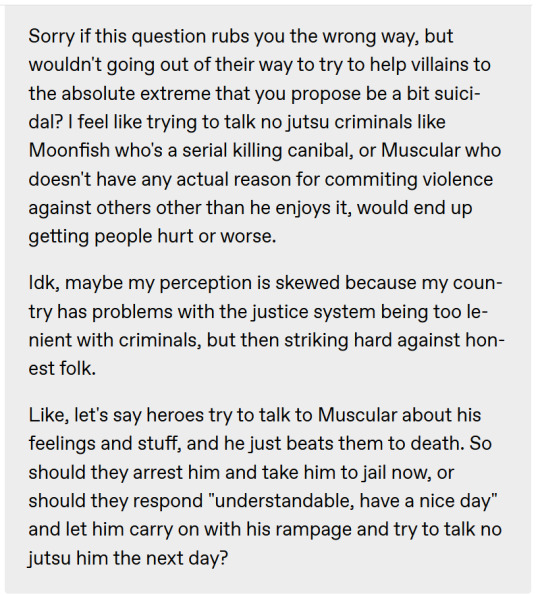
What I think is that there is a lot of air between “beating up Villains while being more concerned about the news camera catching your good side than you are about talking to the human being you’re pummeling” and “trying to talk to the Villain but just shrugging and letting them carry on if it doesn’t work”.
A perennial response Villain fans get when they talk about this is an exasperated, even outraged, “What, so you’re saying Deku should just let Shigaraki kill him or innocent people?!” And like, no, that’s not what we’re saying at all, and it’s a really reductive, bad faith characterization of the argument. So I want to talk first about what Villain fans are saying, and then I’ll circle back to your question about trying to talk no jutsu the really bad news Villains and what Heroes should do if that talk no jutsu fails.
First things first, and to get it out of the way, not all Villains are on the level of Muscular or Moonfish. For the vast majority of the series, the numeric bulk of Villains are just street criminals. It would not be a life or death struggle for Kamui Woods and Mount Lady to try and talk down a purse snatcher together. There is so much room for positive change in how Heroes engage with street-level Villains that just gets glossed over entirely when people want to spin-kick the argument all the way to S-class threats like post-surgery Shigaraki.
Note how handily and briskly Hawks deals with the nudist flasher guy when he’s walking around town with Endeavor—he doesn’t even glance in his direction. Would it have been so impossibly hard to use his feathers to pin the guy’s coat back together and then cheerfully ask him why he went and did a thing like that?
So just keep that in mind, first of all: for the vast majority of what a Hero does day-to-day, especially the powerful ones who are way up near the top of the rankings, there are options available to them beyond “immediately resort to extreme violence” or “give the Villain a thumbs-up and walk away, whistling to cover the sound of civilian screams.”
But okay, how about with the more dangerous Villains? Well, the point still stands: multiple heroic characters throughout the manga show themselves to be entirely capable of carrying on a conversation—be it with the Villains or with Hero allies—while fighting. Mirio is able to temporarily keep ShigAFO talking and distracted by simply asking him a few basic questions; he and Nighteye both are able to get at least some answers out of Overhaul(!) just by asking about his intentions. Ochaco and Toga have coherent conversation every single time they fight. Hawks and Twice have a whole argument while fighting. As soon as Shouto can be bothered to talk to Dabi, Dabi’s eager to spill his whole backstory to him.
Shigaraki in particular comes off as desperate to share his grievances practically every time Heroes encounter him, and that only stops being true at the very end—and even there, it might be less true if that green twit fighting him could have been arsed to just fucking ask him, “Hey, last time we fought, when we were in the same headspace, I saw an image of you crying with a dog. What was up with that?” Deku doesn’t have to stand there with his hands in the air while asking! As all the examples cited demonstrate, Heroes are more than able to fight and talk at the same time. So why don’t they try to make that talk a little more actually useful?
What I’m saying is simply that I would like it if less of that conversation were dedicated to Heroes giving moralizing sermons about how bad and unforgiveable Villains are and a lot more of it were dedicated to Heroes just asking why the Villains are doing what they’re doing, and letting the conversation go from there, fighting defensively and keeping the Villain focused on them as much as they’re capable of doing. We see the results in the series when Heroes bother trying this—think Deku’s results with Gentle Criminal or Ochaco’s with Toga—so it’s damning that they don’t try it more often.
The likely explanation is that professional heroism as a matter of practice and culture does not tend to bother with de-escalation tactics; after all, while you’re standing there trying to talk to the bank robber, some other Hero could easily be coming in for the take-down, and then they get all the credit and glory and not least the pay. The whole system is geared towards rewarding fast, uncompromising takedowns, ignoring the possibility of more peaceful, productive resolutions in favor of stopping the Public Disturbance as quickly as possible, because it’s more important to stop random civilians feeling inconvenienced than it is to maybe try addressing a Villain’s issues so they stand down themselves and are less likely to become hardened criminals.
Heck, even Deku really only gets anywhere with Gentle because his first instinct—shutting down the fight right away with a Smash—gets him rebounded off an air trampoline with enough force to knock him back nearly a neighborhood block. The defensive, evasive nature of Gentle’s power means it’s difficult to hit him directly, and Gentle’s personality was such that he kept talking while Deku was figuring out how to beat him. That talking was really what gave Deku enough insight to trigger his empathy, so he started returning the conversation in ways that he never did against e.g. Stain, AFO, or in his first fight with Muscular. He didn’t lead by asking why Gentle was invading his school, though; he just ordered him repeatedly to stop.
Heroes and, in turn, the kids, just don’t default to trying to talk to the Villains. We see that they can, they’re just not trained to, so it becomes a tactic of last resort, or of distraction, or, finally, as being the result of moments of connection that make them incapable of continuing to ignore the Villains’ humanity. But when it’s a last resort like that, when they don’t bother asking questions until after the Villains have been pushed past the point of wanting to engage, everything gets so much harder and more dangerous.
Look at Shigaraki and Toga. When Deku and Ochaco initially encounter them, the kids’ first response is basically just revulsion and terror. And like, okay, they’re students, newly fledged Hero Course trainees. They shouldn’t have been facing real life Villains for another two years, at least! So it’s not surprising that they don’t know what to do and don’t react in the most empathetic manner possible. I’m not blaming them for that. But I do want to ask what would have happened if their classes and the Hero culture were more focused on attempting dialogue with Villains.
All Might at USJ writes Shigaraki off as a faker with no real beliefs, and Deku at the mall calls him an incomprehensible cipher, but what if either of them had instead asked Tomura why he was there and what he wanted, then asked follow-up questions from there? How much earlier might they have found out that Shigaraki had some tragedy in his past that he blamed All Might for not saving him from? What might finding that out early on have led them to change about how they approached Shigaraki in subsequent encounters?
If Ochaco and Tsuyu had asked Toga why she attacked people, then followed up on whatever answer Toga gave about liking blood with some questions about consent, how much sooner might they have found out that Toga spent her whole life feeling ostracized and repressed because she was convinced by the adults around her that people finding out she craved blood would make her a freak in their eyes? How might they have engaged with her differently if they realized her parents had been verbally abusing her since she was three years old?
But we also don’t have to stop with U.A. types! Toga went on the run at only 15—how many times did she have had close scrapes with arrest before the training camp attack? How many other opportunities were there for someone to talk her down before she made it to the League? Heck, even all the way to the end, if the green twit hadn’t just insisted on antagonizing Toga one last time for the road—as if he’d learned nothing at all since the mall scene!—how much more easily might Ochaco have been able to engage with her? Maybe if Toga hadn’t set her mind to embracing Villainy because Deku functionally became yet another person calling her a freak, Ochaco could have gotten to the breakthrough point before Toga stabbed her in the gut?
I’ve been talking about the more sympathetic Villains here so far, but all this goes for the rest of them, too. Sure, Moonfish is a cannibal serial killer now, but was he always? Or was there a time when he was just like Toga, a teenager wrestling with quirk-driven hungers who was abused and ostracized for them? I’ve thought, from time to time, about the idea of a League ageswap AU, where Moonfish is that scared but defiant teenager who’s been pushed over the edge and done something violent, but is not yet past saving. Conversely, it’s all too easy for me to imagine a Toga who was never captured and never shown any compassion growing into an adult who fully embraced her vampire serial killer reputation and “deviant” hungers to become just as much an alleged monster as Canon Moonfish.
How about Muscular? Was he always a violent sadist? Was it impossible that he could have grown up to be anything else? Could that taste for violence ever have found an outlet other than murder? Could he have gotten into underground fighting, like Rappa? Could he have become a Hero like Mirko, always hungry for a better challenge than she’s getting? Quite frankly, even if Imasuji Gouto was a violent little bully who killed neighborhood pets as a child, he still deserved some kind of intervention—psychological counseling, medication, more acceptable outlets, etc.
How many Villains would HeroAca!Japan be spared if the people in power were more focused on intervention and rehabilitation at every stage of a Villain’s life and career? Why do Heroes think it’s helpful or necessary to tell everyone in earshot their personal opinion about the unforgivability of their opponents? Why is it such a problem for some readers when Villain fans point out that a lot of issues could be sidestepped entirely, and the HeroAca world considerably bettered, if the Hero Industry were less focused on showy grandstanding violence, less terrified of the optics of being anything other than maximally harsh on Villains?
That all said, that’s the nuance of what I want when I say I want more talk no jutsu. But let’s go back to your question—what should Heroes do when they run into Villains who can’t be talked down?
Say that all the interventions and counseling programs have failed, and someone—some mother’s son, some father’s daughter—has grown up to become a Villain. And not just any Villain, but a really dangerous one. What do?
Well, I do still want to see Heroes try to talk first, unless they have some reason to believe talking won’t work, like knowledge that knowing that efforts in that direction have already been made and documented in previous encounters between law enforcement and the Villain in question. There’s also some flex here based on how capable of dragging out an encounter the Heroes on-scene are, and how much danger any bystanders would be in—I would want more effort from someone who can hold their own for long periods like Deku than e.g. Manual. But like, anyone can yell a few basic questions about motivations to see what sort of response they get.
But say our Hero is up against someone like Muscular, who just laughs off questions like that. What to do then?
Then arrest him.
Seriously, this is not that complicated. I’m not asking some run-of-the-mill Hero to get their arms ripped off trying to give battle therapy to Muscular! But I do want Muscular to get therapy, or at least be offered it, once he’s no longer presenting an immediate threat and those conversations can happen in a safe environment. And if he doesn’t accept it,[1] I still want him to be treated as humanely as reasonably possible in prison, with the therapy option always on the table if he ever wants to try it. I also want his prison term (even if it’s for life) to not involve methods of punishment that are considered by the United Nations to constitute torture, like Tartarus’s apparent extended solitary confinement.
1: Perhaps because he would rather rip his own arms off than talk about his feelings or waste any more time getting analyzed by shrinks than he already has; pick your poison based on why and for how long you think he’s been killing people.
I truly do not have any problems, ethically speaking, with Heroes arresting dangerous Villains. My problem has always been that Hero Society is comprehensively awful in how it treats those who don’t fit neatly into society’s little boxes. Their social support networks are full of holes, their law enforcement is financially disincentivized from attempting de-escalation, their judicial process is completely invisible, and their prisons are concrete holes that only serve to make people worse, as we can see clearly in the case of people like poor Ending—already unstable when he was first arrested by Endeavor, but so blatantly suicidal when his sentence is up that the literal first thing he does after release is to investigate Endeavor’s personal life so as to find a way to goad Endeavor into killing him.
Now, sure, Heroes are not responsible for prison policies and practices; those are under a completely different part of the criminal justice umbrella. Nor is it up to them to determine how e.g. financial aid programs or family services work. But I want Heroes to be better in the ways that they—personally and professionally—can be, and I want them to be cognizant of the flaws in the system they uphold. I want them to have some basic intellectual curiosity about the Villains they fight—why they turned out like they did, if they can be helped, and what’s going to become of them after the Hero hands them off to the police.
Like, what is All Might’s opinion on Tartarus? He spent 30+ years fighting for the society that maintains it—does he think or care at all about the fact that some extremely damaged, abused people wind up in there after he gets done beating them up? And if he doesn’t, what does that say about him? What would Ochaco have done if Toga had lived and said she’d rather Ochaco kill her than let her go to prison forever? Does Shouto think now about the family situation of every Villain he fights, or did his ability to care about “some mother’s son” begin and end with his mother’s son?
Obviously, Heroes stop Villains all the time; I’m not asking them to do deep dives into the history and treatment of each and every one. I just want them to ask the questions they can while the Villain is in front of them, and to care about the state of both the systems that produce Villains and the ones tasked with their care. I think that when handing people over to state custody, Heroes have a responsibility to be meaningfully confident that the state won’t abuse that custodianship. If they aren’t—if they truly don’t give a shit about what happens to Villains once the police van door swings closed—then in my view they’re no different than any professional who shirks their duty.
So many people insist that the kids—that Heroes in general—have no duty to care about the Villains, but to me, this view comes off as wildly ignorant about the wide variety of jobs in the real world that do, in fact, confer a duty of care.
If…
…a teacher sees a child with unexplained bruises but doesn’t bother to do their due diligence as a mandatory reporter—
…a prison guard leaves a handcuffed inmate alone in a room with a fellow warden wearing brass knuckles—
…a medic doesn’t speak up when a flight attendant asks if there’s a doctor on the plane—
…a bartender just keeps on serving someone who’s obviously intoxicated and then lets them stumble out the door to the parking lot—
—then they are shirking their duty. There is no shortage out there of examples of this sort of responsibility, one that you can be held legally responsible for, one that you choose to accept when you sign up for the job.
Heroes are not Samaritans doing the work out of the goodness of their hearts; they’re not vigilantes just trying to keep their own patch safe. They’re government employees, crucial members of the lawful system they represent. They have to care—not personally, not individually, but on a professional, structural level, they have to care about the people they fight because the system has to care about those people. And if the system doesn’t care, the system has to be changed.
I'm segueing here into real life stuff, so let me note as a disclaimer that what follows is based on my cultural familiarity with American policies, as well as periodic research into that of other nations. I don't know what country you live in, rvg, so I can hardly speak to its crime-and-punishment situation. This is all a lefty American's opinion on what reading she has done about American, Japanese, and, in the case of this particular post, Scandinavian criminal justice systems.
That said: in real life, de-escalation works. One of the things you’ll often see talked about in police reform/abolishment circles is that the police are, quite frankly, doing too much work. Or, more specifically, they’re doing the wrong kind of work, work for which their training has not prepared them and which other groups would be far better suited to handle.
Here’s an article on offering a campus police force de-escalation training and the resulting 26-36% drop in injuries suffered by both civilians and officers; it also talks about how de-escalation tactics are used by SWAT teams but regarded with suspicion by patrol officers, with this quote being particularly telling: “[Special operations] officers were taught to use time, distance and cover to their advantage. For patrol officers, time was viewed as 'The more time you give a suspect, the more danger you're in.'” De-escalation is not the usual training patrol officers get, so it runs against their gut feeling, despite its proven effectiveness—compare this to BNHA’s repeated focus on speed in shutting down altercations.
Here’s an article on the results of a test run of a program in Denver, Colorado, in which police officers were completely removed from response teams to 911 calls about situations considered low risk (drug abuse, trespassing, welfare checks, etc); instead, teams of mental health specialists and paramedics were dispatched. Reports of nonviolent crime dropped 34% over the course of the time the program ran, and the direct financial cost of the response was four times lower than sending police.
The classic dramatic image of this sort of thing is the hostage situation—and when I looked into it, numerous articles said that containment and negotiation tactics have over a 94% chance of resolving hostage crises without fatalities!
The common element in this sort of thing is refraining from showboating displays of force, loud assertions of power and authority, arguments, moralizing, threats, and so forth. Far more effective is listening, active attempts to communicate and understand, not throwing one's weight around and not rising to aggression even when provoked.
Meanwhile, on the carceral side of things, restorative justice leads to greater satisfaction from both victims and perpetrators, more feeling that they were listened to and respected, and increased belief that justice was served. While the evidence on its impact on recidivism is mixed, it certainly doesn’t seem to be less effective than traditional retributive justice, and may well be considerably more effective if combined with programs that focus more specifically on lessening recidivism than restorative justice alone (research is ongoing).
This article on how “cushy” Scandinavian prisons are far more effective at reducing recidivism than their much harsher, bleaker American counterparts argues that a crucial factor in reducing recidivism is minimizing the amount of resentment criminals bear towards the system. When perpetrators can point at unjust or disproportionate punishments, cruel treatment by wardens, rejection by society, etc, it’s much easier to stew on resentment, to turn nastier themselves, to blame outside factors. Conversely, when life inside prison is made as much like life outside prison as possible with the key difference being the crucial deprivation of freedom, that resentment is defanged, leading to more more self-reflection and willingness to accept responsibility. And again, it works: Norway is a world leader, with their recidivism rate being a mere 20% compared to the U.S.’s nearly 77%.
The studies and the evidence for this stuff is out there, it’s just fighting this huge, ugly uphill battle against people who care far, far more about inflicting punishment than they do actually improving outcomes. And so much of that is based on cultural values—what people believe, what values they’re taught. That's where pop culture comes in.
That last article I linked above talks about the efforts made in the U.S. to turn prisons into a for-profit industry, and how demonizing criminals to encourage maximum sentences helps that effort; here’s another on how U.S. police departments rehabilitated the popular image of the police in the early part of the 1900s as bumbling fools or a corrupt gang by consulting on the writing of police procedurals, most crucially starting with Dragnet in 1951, but continuing even today. Here’s one on a growing concern in Japan about the relationship fostered between TV studios and police when police permission and cooperation is required for filming those popular reality TV police documentary programs.
Mass media and pop culture informs this stuff. True, Horikoshi is not having to get his work cleared by a police PR department to publish it, but you can see from the above how the police have used and do use mass media to polish up their image; they see it as an effective tool to use because it is. And the closer to our reality a work of fiction is, the more obviously it resembles the world around us, the more it seems to purport to moral instructiveness, the more true that becomes. That’s why I criticize BNHA much more harshly than any number of other manga or anime I follow where Good Guys Kill Bad Guys all the time and no one thinks twice about it: because those series aren’t parading the Good Guys out as Japanese citizens working with Japanese police under Japanese law to maintain the rosy image of the Japanese status quo.
I’m long past the point where I’m just rambling, so I’ll wind it down here by pointing out this: Horikoshi also thought that things in his world needed to change. As much as I loathe BNHA’s endgame and think much of its epilogue is trite shoulder-patting pablum that fails to meaningfully address the setting’s real problems, multiple aspects of Hero Society were at least nominally challenged and subsequently changed: citizen inaction, the dominance of professional heroics as a career path, the diminishment of non-Hero careers, quirk-based discrimination. As a direct result of the main characters’ efforts to address places where the old system was failing people, the incident rate of Villains is decreasing.
The fact that these changes are made provides in itself the evidence that they needed to be made. I think they need to go further still: my number one greivance with the epilogue is that we've seen all these changes aimed at reducing the numbers of Villains that arise in the first place, and that's nice and all, but we don't see any evidence that the Villains that do arise are treated any differently than they ever were, not even the common purse snatchers, much less the serial killers, the cannibals, and the terrorists.
So, should Heroes have to get themselves nearly killed trying to reform a Villain? Ideally no, but that assumes a world where Heroes are working in concert with a bunch of other people who are also dedicated to preventing, reforming, or rehabilitating Villains. If none of that other personnel infrastructure exists, then, well, to paraphrase Nedzu, someone has to take the first step. Why shouldn’t it be the combat-trained professionals with shounen battle stamina who also happen to be the main characters?
#bnha#bnha gets real#long post#bnha hero society#bnha muscular#bnha moonfish#league of villains#no. 2 green#bnha critical#stillness answers#i know applying real life criminal justice philosophy to shounen battle manga is an endeavor that is only less doomed than it is pretentiou#but what is one to do when faced with a work like bnha#and the false binaries its narrative all but begs its readers to embrace#randomvongenerico
90 notes
·
View notes
Note
What makes prose good unto itself (and not just as a delivery mechanism for plot/character)? Despite being an English major I never really grokked this, beyond basic advice like "use significant images."
I would break down prose quality into two major parts, each of which is very broad and can be achieved in many different ways.
Part 1: Is it good aesthetically?
This is very simple. Does the prose sound good? This is usually achieved via a lot of high school English test terms, stuff like assonance, consonance, alliteration, rhyme (internal or not), meter, repetition, etc. but can also be a factor of syntax and word choice: "dismal" is generally a more evocative word than "bad," for instance, though given context one of those words might sound better than the other. Bad is shorter, harsher, more abrupt, compared to dismal which has the S and L sounds that glide. Dismal also sounds more British, which comes with its own array of connotations that can affect how the reader reacts to the word. Compare "I pray you burn in the flames of eternal damnation" to "I hope you die in a fiery death."
Punctuation, sentence length, sentence structure all make some kind of change to the way a sentence reads. Parentheticals, abrupt stops, sentence fragments. They influence the aesthetic experience of reading the text, and the best prose wields all these tools (and more) strategically to create the greatest aesthetic impact. If someone is specifically trying to make their prose unobtrusive to the semantic content of plot and character being conveyed, they are surrendering aesthetic control.
Part 2: Does it contribute meaning?
It's one thing to craft a beautiful sentence, but if it's beautiful simply for the sake of being beautiful it can often come across as needlessly indulgent. (The purple prose criticism, though in my experience most truly purple prose is aesthetically bad.) The best prose is also contributing to the meaning of the work through its aesthetics. The most obvious way this is done is through tone. Tone is how a story feels, and in many ways is far more important to a work than plot or character. A horror story has a certain tone. A comedy has a certain tone. To an extent tone can be conveyed via plot (i.e., a story where people are murdered will innately have a different tone than one in which they are not), but most of the heavy lifting on this front is done by the prose: a dark, oppressive atmosphere will put a reader on edge, even before someone is slashed in the attic.
Beyond tone, prose can provide insight into character (especially in free-indirect discourse, AKA close third person, which is extremely popular in contemporary literature) or theme. Symbolism, metaphor, various other literary devices can be used to this effect, or even simply more mundane elements like sentence length. Cormac McCarthy wrote two novels about brutal, violent journeys through utter waste lands - Blood Meridian and The Road - but the vast differences in the prose of those two novels make starkly different statements about what that violence means. Blood Meridian being a work of excess, of hedonism, while The Road is a work of restraint, of emptiness, of lack. And this is even with both works doing many of the same of McCarthy's goofball punctuation gimmicks.
I don't think anything I said here is very deep or difficult to grasp, and in other artistic mediums correlated concepts are taken for granted. In film, if you want to convey information in the easiest-to-understand method, then just do shot-reverse shot as two characters talk. It's simple, basic, and if what the characters are saying is interesting, nobody will notice. But the best films use blocking, dynamic camera angles, and varied shot length and composition to subtly make statements about character, setting, tone, and theme, while also simply looking more aesthetically pleasing. That's what prose can do for a work of literature. And the truly best prose stylists, the people pushing the boundaries of what can be done with language, will come up with prose compositions that I would never even expect.
64 notes
·
View notes
Note
Hi, dear cool person! Do you happen to know if all magic circles in lcf are drawn on the ground or if some types can be done in the air? Do they need a physical surface for them to work? I got a little confused by that and couldn't find an explanation yet (╥﹏╥)
Hello, "dear cool person"! 😊 I admit, no one ever brought up that kind of question to me, and I think it's worth investigating!
First of all, to make things clear: TCF/LCF uses what we call "Soft Magic System". In other word, the rules concerning magic are vague, without much elaboration from the narrative – which I have to add, does NOT equal poor world-building.
People often toss around Fullmetal Alchemist as an example of good world-building (which everybody who knows me is probably aware, is one of my favorite series of all time), without understanding that FMA uses "Hard Magic System" as it plays a vital role in the story. How alchemy works is very important to the plot and its themes. While my inner nerd absolutely loves it, I must remind myself that it's not a required element for a story to be well crafted. There are many series which go into great detail about their magic systems, but that doesn't actually guarantee it will be successful in making the story enjoyable.
"Soft" or "Hard" magical world-building, what actually matters is how it's used.
So, in TCF we are dealing with "Soft Magic System", because how magic works is never actually important to the story itself; what the characters are doing matters far more than what exact tools and powers they're using. The "what" of their capabilities is always more emphasized over the "how".
Obviously, we know some of what magic can do, as we get many example throughout the series. We also know that there are multiple other powers in that world aside from mana-based magic. For example, regular magic can be used to create fire, cast illusions, teleport, levitate objects, and even for telepathic communication. Dead mana magic can be also used in similar ways, like casting illusions or creating light. There are also powers of Nature, Beast People abilities, Earth Abilities, Divine Powers, and quite a few of others.
But the question is about arrays specifically. Let's try to find a couple of examples to work with.
We know that circles CAN be drawn, at the very least. The earliest instance of an array being used was way back during the Plaza Terror Incident, when blood-crazy mage Redika tore up a teleportation scroll to escape the plaza. So we see that certain spells can be pre-made and are one-use only, which makes sense. Not everyone seems capable of teleportation, especially long-distance. Remember, Dragons are super rare and the fact that Cale has basically unlimited access to instant teleportation through Raon is basically cheating lol. I assume it's both difficult and expensive to create even a single scroll like that. It requires lots of effort and preparation, not to mention it's set for a given location – the word "coordinates" is often dropped throughout the story.
We also know that circles can be created through magic in an instance, as that's basically what Raon and Eruhaben do every time they teleport. But once again, they're Dragons, so I assume you have to be Arch Mage level to do that type of stuff without literally drawing the array. Definitely not something Redika was capable of. I also suspect Rosalyn could do that, but that's because she's a rare talent of her own – not to mention how Eruhaben taught her on top of it.
I struggle to find any example of array-based magic that ISN'T about teleportation, however. Perhaps all arrays ARE meant exclusively for transportation in TCF? Feel free to correct me if you find any evidence to the contrary. Another example that comes to my mind is when they were teleporting the Castle of Light, later re-named Black Castle, into the Forest of Darkness. We know it required a huge amount of power, which was why Eruhaben asked Cale for magic stones. We didn't actually SEE them cast the array, however, so we don't know if they literally needed to draw one around the castle, or if they used their Dragon powers again to simply make it with magic.
There are several conclusions I draw from all of this.
First, most if not all examples of array-based magic in TCF are teleportation-related. So either all arrays are about teleportation, or teleportation is a very complex brand of magic (which would make sense) and arrays are exactly for that type complex magic, so they could be also used for other things.
Second, it seems that drawing arrays is a "human method", but it is unnecessary for Dragons, as they can use magical shortcuts. So naturally, I don't think they need a solid surface to work with when they're casting spells.
Third, arrays can be either instantly used and created – if you're powerful enough that is – or they can be pre-made and "loaded", then used for emergencies via deliberate disruption. I also assume you don't need to be a mage to use a teleportation scroll, if it already contains all the magic needed.
And that's basically all I have to say about magic circles in TCF! I hope this was helpful 💖
70 notes
·
View notes
Text
One thing that absolutely drives me crazy (positively) about the Handers relationship is that it both begins and ends with the transaction on Anders' part.
It starts with Anders basically saying "I know you've been looking at me funny all this time, and you should know that I've been looking at you funny too, but I thought that after Justice all these stupid infatuations were over for me, and I always knew that us being together would be wrong, and I know that I'm damaged goods, but I can give you myself, my body, my heart, my affections, if you'll let me."
And he's very open about why he's making his move now, but I feel like the fandom is completely forgetting the context.
All the romantic stuff happens right after Ser Alrik. Anders has just almost killed Ella because his connection to Justice is unstable and his anxiety is at an all-time high and for many other reasons, and then of course the Templars start raiding Darktown because of Ser Alrik's death and...
It's not the first time they've been looking for the apostate healer, is it? It's not the first time they've been sniffing around for the Mage Underground, either. So what has changed? Why does Anders only make his move after the thing with Ella? In the context of the short story, I think it's pretty obvious. Anders is afraid that he will lose control again and go on a bloody rampage, but this time not against the Wardens or Templars, but also against innocent people.
He even says this in the next scene. "What if that creature of Vengeance turns on a patient?" He also says that Hawke was "the only thing that kept [him] from murdering an innocent girl."
And I think that's the key to understanding his motivation. If Hawke and Anders are friends, then Hawke is the one who calms Justice down. If they're rivals, then Hawke is helping Anders to separate himself from Justice, to possibly gain control of the spirit.
So for Anders, it's a transaction of his body and his love for the safe space that Hawke can create, not for Anders himself, but for other people.
And in the third act, he offers Hawke another deal, only this time it's not just his body, it's his life in exchange for Hawke to become a hero again.
He literally gives Hawke all the tools they need to get richer, gain power, and even become a true noble (something that was completely impossible for the mage Hawke before). Just like Arishok, he offers Hawke an easy solution to all of their problems, and whether Hawke accepts that solution or not is up to them.
I find these parallels so interesting. It's such a good narrative choice, even if it's a heartbreaking one, and it's so, so in character for Anders, who has no reason to believe in unconditional love because of the way his life has gone.
He thinks that Hawke can only love him if he is useful to them, so he makes himself useful with sex, with affection, with healing, with Vengeance, and even with his death.
Truly heart-wrenching stuff. I love it.
28 notes
·
View notes
Text
The Heart Killers' Colors? - Ep. 11
I saved over 100 images for episode eleven of The Heart Killers’ so writing “I’m in my feels” in an understatement, and this episode beginning with this beautiful shot of the boys at descending heights, Style being the highest in pink, and the lovers reuniting at the center really emphasize this is a love story.
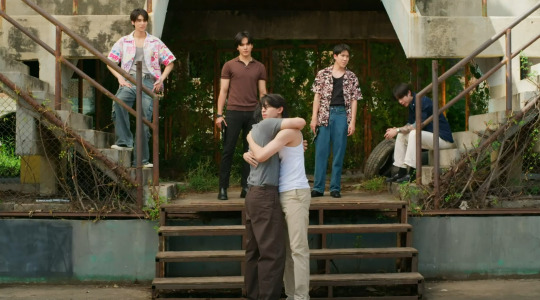
Style's shirt even says "love" and I need the GMMTV wardrobe department to get a raise!
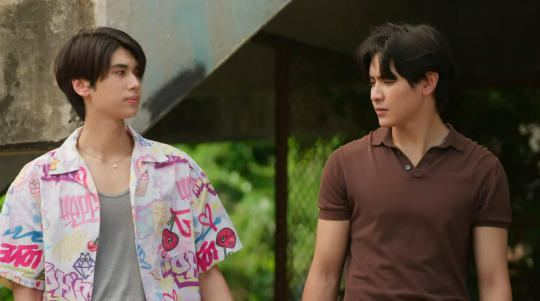
However, I’m still pissed that the boys did not kill this man!
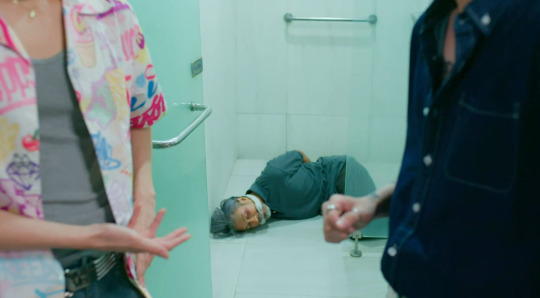
Liliana, I thought you raised them better!

But now that Black Brooder Fadel and Red Rascal Bison have found love, they are done killing (even if they should still take the shot).
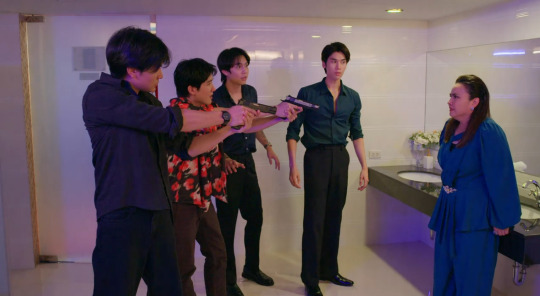
And Style, the biggest lover of them all, makes perfect sense because I, too, would be acting a whole damn fool for this beautiful man and begging him to give up the hitman life since Style knows it doesn’t actually make Fadel happy.
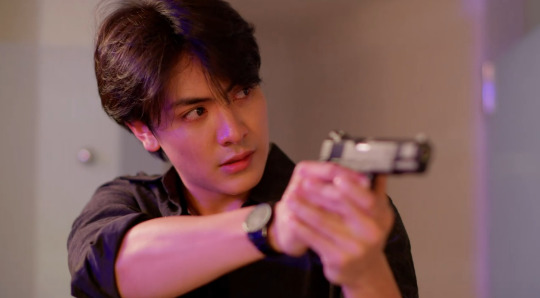
So even though I’m already thinking about how good Joong and Dunk are going to look in Dare You To Death since this will be their aesthetic, I’m also very pissed that this white man is about to break up the these partners (in crime) since he doesn’t understand this Black Brooder and Red Rascal are in a LOVE STORY (with two possible Blue Boys, but I'm not here for those lies)!
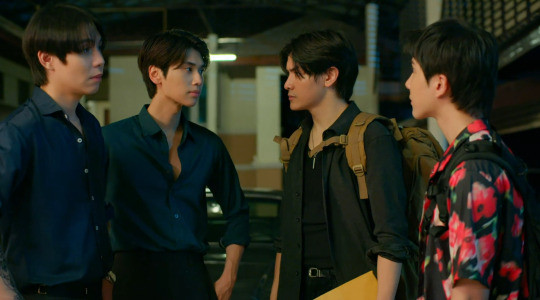
Thankfully, Style’s dad understands what genre his son is in because even if I’m not sure about Style’s color, we all know he is deeply in love with his Black Brooder (who is wearing the hell out of that tank *bites bottom lip*), so it’s time he puts a ring on it, and makes Style Mr. Hitman’s Husband.
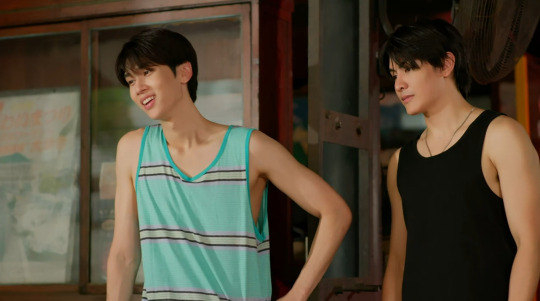
Even Kant understands this! I don’t think he even knows his color, but he knows he is in love with a quick-tempered and aggressive Red Rascal, so an exhibit about a volcano killing everyone is the perfect place to propose a proposal to him.
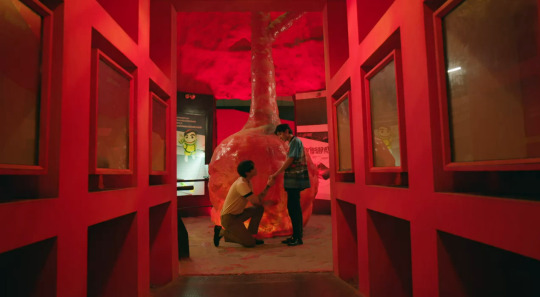
It’s also the perfect place to have these adorable inflatable suits with red (and blue . . . Kant, what is your color, bro!) on them.
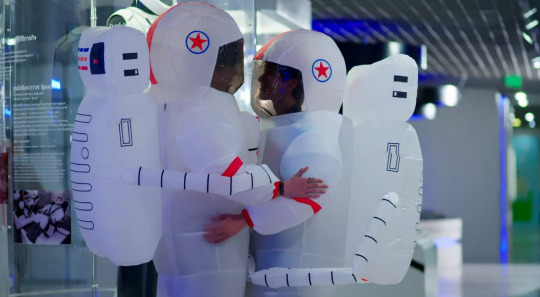
But we all know the only reason for the suits was so the show could introduce this line into the mix. Kant and Bison have said the freakiest stuff in this show, and I appreciate First and Khaotung getting an opportunity to be play characters who are weird about each other.
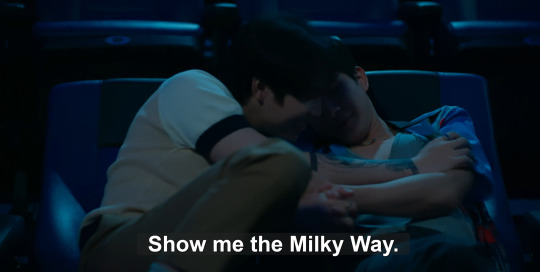
Fadel can’t allow that though. He must out-weird everyone. But first, let me enjoy this scene.

Okay, now for my emo kid to show just how “weirdly romantic” he is.
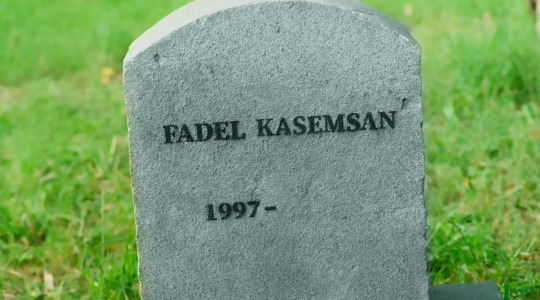
I know Black Brooder Fadel is super duper emo (Paramore’s “The Only Exception” plays in the distance), but Style is just so in love with him that their perfect emo love story is healing my heart. Style is Death Cab for Cutie’s “I’ll Follow You into the Dark” (Love of mine, someday you will die, but I'll be close behind. I'll follow you into the dark) and I love that Style continues to prove that Fadel’s darkness does not scare him, but is the reason he loves him.
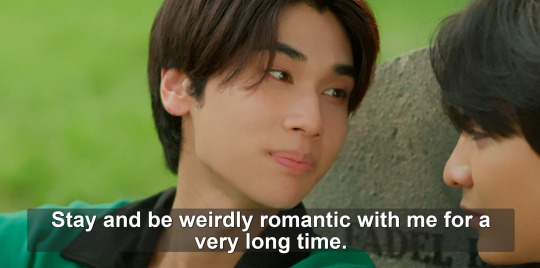
I LOVE THEM!
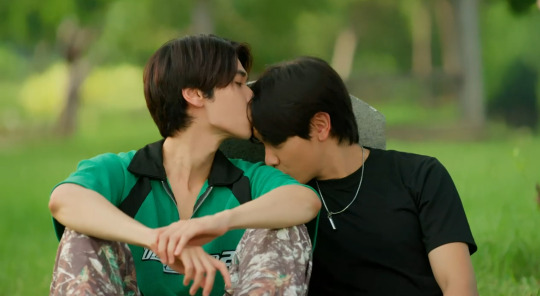
And now they are going back to the support group to share their fears leading to Style basically proposing. That’s my boy! He doesn’t need to wait for Fadel. He can propose!
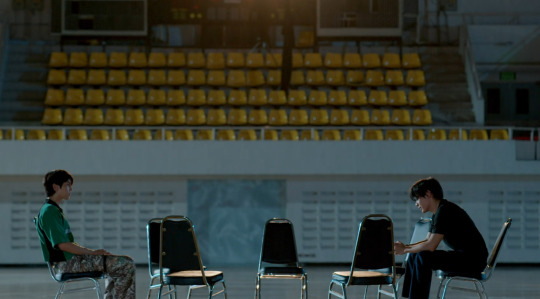
And seal it with a kiss. They are my OTP!
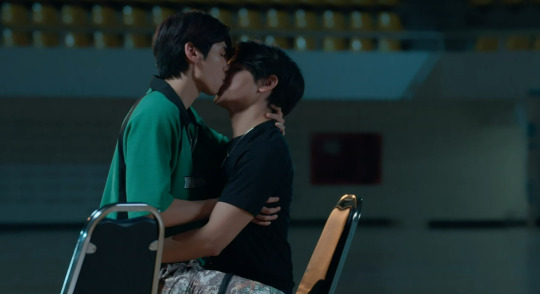
Fadel is giving Style is heart pin, and that is a reversal proposal. He is giving him his heart. I feel the tingle of a tear of a forming in my right eye!

And now a romantic dinner after cooking together! This is “peaches and plum, motherfucker.” This is “In another life, I would have really liked just doing laundry and taxes with you.” This is “we deserved this domestic happiness, but even if we don’t have it, I’ll still love you in every version of us” and I’M UNWELL ABOUT IT!
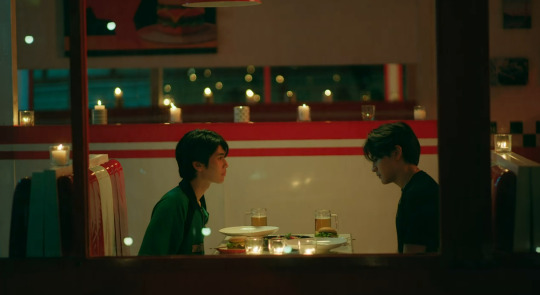
Of course Kant is looking like an angel surrendering his tools, so Bison can claim him with a tattoo.
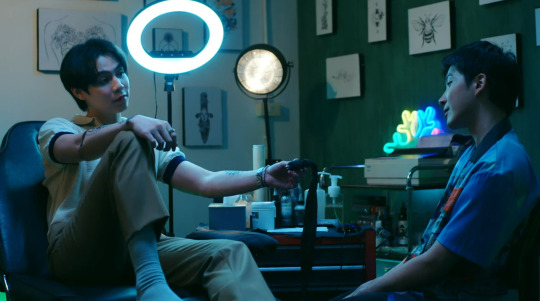
They are beautiful, and this calming blue light is physically hurting my feelings because now my left eye is tingling with a tear.
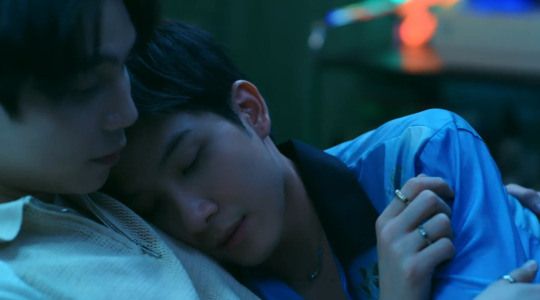
Fam, I’m going to be honest, I’m not doing too hot. I don’t give two effs about the colors right now. This hurts way more than I expected.
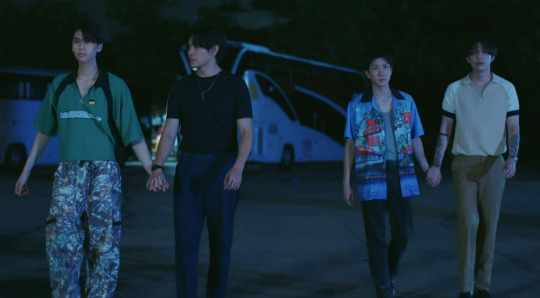
AND NOW KANT IS CRYING! Don’t have First cry because then my bitchass starts crying. Don't look at me!
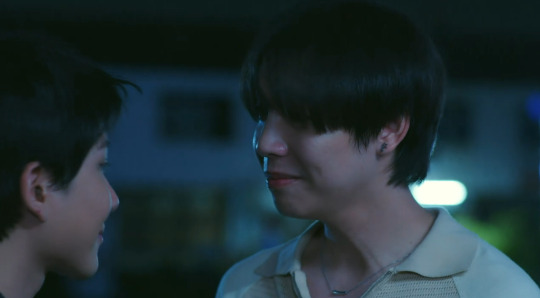
FUCK!
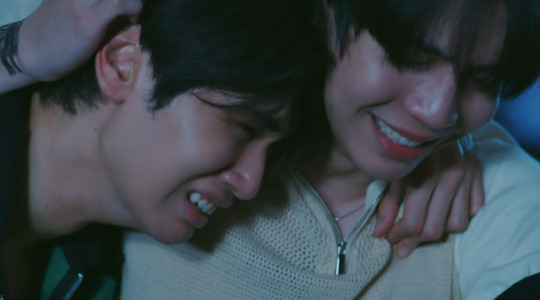
FUCK!
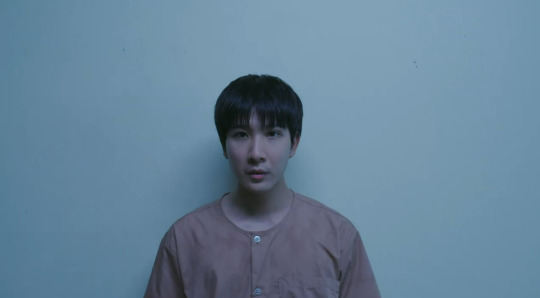
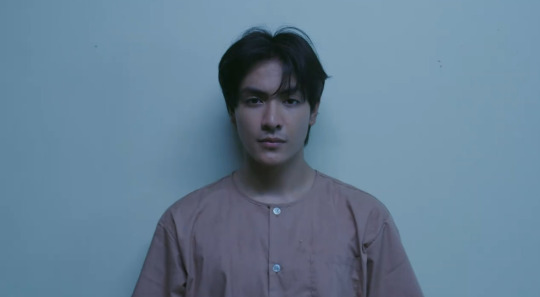
Jojo, don't you hurt me like this. This is not HIStory 3: Trapped.
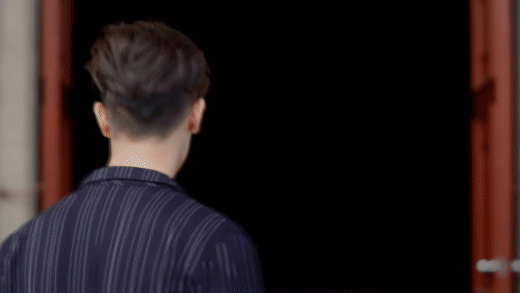
FREE MY BOYS!
#the heart killers#the colors mean things#color coded boys in love#episode eleven#They better be in jail for five days#five weeks TOPS!#let my boys be free#I cannot go through this again#they did nothing wrong#and even if they did . . . I DON'T CARE!#my eyes are tingling#DON'T LOOK AT ME
55 notes
·
View notes
Note
These have been pent up for a while, so there's a whole list lol. Some are Aurora, some are not.
1) Can lacrimas carry out multiple purposes at once? Or will they blend them? I'm assuming that this is possible, considering that the automaton in the ruins was using a lacrima as a brain
2) Has anyone tried to make tools or weapons out of lacrimas? I'm talking like chisel that needs no hammer. Or maybe a Fire lacrima on a bow that sets your arrows on fire
3) Can you engrave runes on lacrimas to make them affect themselves?
4) Where can I read more about the Twins? If I'm not wrong they're the creator gods, aided by the Light dragon and the Void dragon to create life, but I might be getting a wrong read on that
5) Since we see Erin successfully become the first Void mage, does that now mean there's potential for him to make a Void lacrima? The dragon probably won't allow it, but still
6) What exactly does elemental corruption of each element do? Fire literally burns you up, as we saw in Arc 1. I can infer that Life likely makes you a chimera. Void corruption makes you a cave crawler. But what do the other one do? Does Earth make you a statue? Does Wind disintegrate you, Thanos style?
7) Now onto the non-Aurora questions, is your art vector or raster? I believe it's vector, but it's always better to confirm
8) What are your opinions on reading into the environment and the character design to infer things about the character themselves? In any type of media
9) Have you played Baldur's Gate 3?
10) Do you have any music that you'd recommend? I've listened to every song I liked so many times that I hate them now.
11) I'm new to Tumblr, anything that I should know? You don't have to answer this one if you don't wanna. I think I know some of the basics already. Reblog what you like, and avoid the terfs, right?
You might be able to tell that I like the idea of the lacrimas a little bit. Just a teensy bit. The artificer in me definitely isn't obsessed. I appreciate any answers you can give :3
Cheers!
Ooh, lots of stuff!
Yes, it's possible. A lacrima can be engraved with multiple spells, set in a casing engraved with commands, or some combination of the two. Typically, all spells engraved directly on a lacrima will activate at once when the lacrima is "switched on", but a spell can be quite complex, and conditional activations are possible - "if-then-else" statements, basically.
Yes, magic items exist.
Generally no. If the lacrima is disrupted or broken, the spell generally stops functioning, so a self-affecting lacrima will run only as long as it takes for the lacrima to distort or break.
There's an extra lore page about them!
He probably could if he wanted to (and the Dragon allowed it) but Void energy is very dangerous, so he likely doesn't want to.
Each form of elemental corruption agitates the presence of the element in the mage's body. Earth corruption can damage or alter bones, encourage unhealthy petrification of soft tissues, etc. Wind corruption can have physical effects but it often most obviously produces breakdowns in the person's ability to speak or understand language. Lightning damages, numbs or intensifies a person's physical senses.
Raster, I draw with CSP's digital pens. I've only very briefly experimented with vector art - I don't like how it simplifies the lines.
I think it's a fun school of analysis but, like all literary analysis, it runs into trouble if it tries to lock down exactly what the writer was thinking or intending (which is an objective fact that one can be incorrect about) rather than trying to analyze the story on its own and what meaning might, intentionally or unintentionally, be factoring into it.
Nope
don't trust my taste in music it's 90% nu metal and sonic OSTs
Like what you like, reblog what you want, generally it's considered dubious form to add a comment to a reblog unless you have something profound to contribute (commenting in the tags is fine), steer clear of discourse and callout posts and generally the sectors of the site that are constantly on fire, blocking someone for any reason is 100% fine
162 notes
·
View notes
Note
Hiiii! May I ask for some advice? After a really long time of not writing fan fic, I recently started getting back into it but have been struggling… So I started using a little bit of the chat.ai help me but I feel icky about it but at the same time, I’m constantly struggling with writers block and being burnt out… What should I do?
i'm actually really glad you asked this because i've been preparing a post about using ai responsibly for writing, might just post it here lol:

tldr: this post isn’t about using ai to generate your story for you. it’s about how to utilize ai to enhance your writing process while still keeping your voice and creativity at the forefront.

the rise of ai has stirred up a lot of talk about ethics, originality, and how much tech should really be in our creative space. as writers, our work is highly personal, it's a reflection of our thoughts and experiences. so it’s totally normal to feel icky about bringing ai into the mix.
here's a hot take, though: ai isn’t here to replace your creativity. it doesn’t get the deep, emotional layers that only a human writer can bring. sure, ai can generate text, but it doesn’t really understand what it’s saying. that’s where some of the ethical concerns come in—if we rely too much on ai, we risk losing that personal touch that makes our stories resonate.
on the flip side, when used thoughtfully, ai can actually boost your creative process instead of taking away from it. think of ai as a helpful assistant, it can take care of some of the boring, tedious stuff, giving you more space to focus on what really matters: writing your story, your way. it’s not about letting ai take over, but using it to support and streamline your process.
this is not a post about my experience with ai, but i have to say, that as someone with adhd, ai has been a game-changer for me. it helps me keep track of my ideas, organize my thoughts, and even manage my writing schedule when my brain is all over the place. it's like having an extra set of hands (or, you know, a brain) to help me stay on top of everything, so i can focus more on the actual creative part of writing.
the key is to make sure ai never overshadows your original voice or creative vision. ai should be a tool that helps you bring your ideas to life, not something that writes the story for you. if you’re curious about how to use ai in your writing process while keeping your authenticity intact, here are some tips to do it responsibly:
brainstorming ideas: when you’re stuck on a plot point or character development, use ai to generate prompts or ideas. these can spark new directions for your story, giving you fresh perspectives to explore.
dialogue experimentation: if your dialogue feels flat, try using ai to generate conversation snippets based on your characters. it might not be perfect, but it can give you new ideas for how your characters might interact.
synonym suggestions: tired of using the same word over and over? ai can help you find synonyms or alternative phrases, keeping your writing fresh without losing your voice. i've found this very helpful as an ESL writer!
outline generation: got a rough idea but need a structure? use ai to create a basic outline, then tweak it to fit your vision. it’s a great way to get a head start on organizing your story.
character backstories: use ai to brainstorm character traits, backstories, or names. you can take these ideas and expand on them, adding the depth and personality that only you can create.
quick research assistance: save time by using ai for quick facts or historical details. it lets you focus more on storytelling and less on getting bogged down in research. (disclaimer: never 100% trust what an ai generates, fact check everything). i've found it a great starting point if i have a very niche question for my research.
editing help: use ai for basic grammar and spelling checks to speed up your editing process. just remember, it’s your judgment that will shape the final draft, not the ai’s.
plot analysis: use ai to scan your draft for plot holes or inconsistencies. it can help identify gaps in logic or missing links in your storyline, giving you a clearer idea of where to tighten things up.
tone consistency: ai can help you maintain a consistent tone throughout your story by analyzing your draft and suggesting adjustments where the tone shifts unexpectedly.
pacing adjustments: ai can review the pacing of your story, highlighting sections that may be too slow or too rushed, helping you find the right balance.
character consistency: track your characters' traits, behaviors, and dialogue to ensure they remain consistent throughout the story, preventing out-of-character moments.
theme reinforcement: use ai to analyze how well your themes are being conveyed across the narrative, suggesting areas where you might strengthen or clarify your message.
draft comparison: if you’ve gone through multiple drafts, ai can compare them to highlight what’s changed, what’s been improved, and what might have been lost in the revisions.

to answer your question more personally, i think we can never please everyone, and ai will continue to be developed and get better and better. i understand feeling icky about using ai, and you might get judged for it, but do what you need to do, tbh.
i have found myself in a writing routine where i use most of the advice above in my writing process. i write most of my work myself, but i use ai as a tool to bounce ideas off of, and it's been a life changer. i managed to finish my first novel draft with the help of ai, and it fuelled my creativity to have "someone" (or rather something) to feed my ideas and help them identify what i could do better.
#nondelphic asks#nondelphic writing tips#writing#writeblr#ai#chatgpt#writers on tumblr#writers#writer#writing community#creative writing#writerblr#writer things#writers block#writers life#writers and poets#writerscommunity#ao3 writer#writer stuff#writing funny#on writing#write#writing meme#writing memes#writing struggles#writing problems#writing humor#writer problems#writing is hard#motivation
48 notes
·
View notes
Note
the recent "ai" llm bullshit makes it hard to talk about stories that use the concept of characters who are ai in the sci-fi sense (and the MANY ways in which this manifests and what it can mean!) because ig people take shit too literal?? or want a cheap joke? so they discard all the intent symbolism and implication. in most of these cases ai is a plot device/concept used for really specific reasons, usually with its own rules per story and just pasting llm's/gen ai as the interpretation loses the point in many cases.
Honestly LLMs have made talking about AI in literally ANY context besides that impossible because much like the blockchain before it and 'gluten-free' before THAT it's just a marketing thing. 'This song's vocals were completed using AI' and it's a very standard audio cleanup algorithm. 'The art in this game was made using AI' and it's animations using automatic tweening systems that have been in use for decades. 'This game uses AI in its programming' and it's a very different use of the term to refer to the programming of NPCs and enemies in a game, a term that's been in use basically since we were able to program those things. It's a goddamn nightmare to have a conversation about any of this because sometimes when someone says 'this company put AI in their program' they might mean 'Adobe decided to put an LLM Image Generator into photoshop for some reason' or they might mean 'A marketer said that this program was 'AI-powered' and the AI in question is a very normal algorithm'.
But like back to your point- the fact that the recent stuff HAS been called 'artificial intelligence' in the first place really unnecessarily muddies the waters in science fiction terms, too. For a very long time we've had a strong understanding of what AI means in sci-fi terms. Machines capable of thought on a human scale, capable of truly learning and comprehending and problem solving. Defining 'intelligence' is kind of a fool's errand but we'll save the anthropocentrism rant for another day- the point is that they're supposed to be self-sufficient learning automata. And often they're utilized in order to explore something about what it means to be human, or alive, or thinking, any number of things. Often there's rules. Asimov's laws of robotics are cited endlessly and offer fascinating starting points. Does sedating and putting a human into deep sleep to prevent them from harming themselves, as all humans inevitably do, follow the spirit of the First Law? Is that ethical? Is it worth living your life passively in order to minimize risk? Is the third law truly more important than the first? Why is the life of a potentially malicious human inherently more important than the existence of a machine, just as capable of thoughts and feelings as the human? Who are we to judge which has more value?
And along comes LLMs- impressive tech to be sure, but a far cry from true artificial intelligence. Cleverbot with access to Google is not exactly what most of us would define as anywhere in the vicinity of 'thinking and feeling' but 'AI' catches a lot more attention than 'Language Learning Model' or 'Neural Network' (though i would argue that 'neural net' while not always accurate at least sounds a lot cooler). Suddenly, this narrative tool we've had for upwards of a century has a new meaning. Older work gets re-evaluated in contexts it was never made for, and new projects have a much more critical eye as people expect them to tackle a new and prescient issue- and if it fails to, may draw their own conclusions from. Nothing new, per se- the pandemic, for example, lead to a lot of people re-evaluating disease as a plot device in media much differently than before, for example. But in terms of evaluation of literary devices go...LLMs feel like they've really done a number on people's ability to read beyond the lines. They see self-autonomous machines doing something bad, and all other themes go out the window in favor of the One Currently Relevant Topic.
Again, this is hardly a new issue. I distinctly remember just several years ago during the airing of Hands Off Eizouken when an errant shiny spot on a helicopter turned the kanji for water (水) into the kanji for ice (氷), and an errant English translation ran with it and turned it into I.C.E.. A scene about a girl feeling trapped in her role by her family and society- an issue commonly explored in Japanese media- is stripped of its meaning and turned into a strange commentary on a contemporaneous American issue by someone who took one look, didn't think harder about it, and decided that's what it was about. Annoying for sure, but I'm at least less inclined to blame the Immigration and Customs Enforcement for existing causing the issue than I am a translator failing to employ proper reading comprehension. I don't like ICE at all but I at least recognize that the issue here is with the interpreter. The same goes here- LLMs are Fucking Annoying but I recognize that the issue here, as usual, is a lack of willingness to engage with the source material beyond the surface level.
#spitblaze says things#if none of this makes sense its not my problem#but also feel free to ask for clarification. i dont mind that
11 notes
·
View notes
Text
All Caught (Heh) Up
I got to chapter 203 today and was very, very sad to catch up to current... I've got brainworms for a few things but for now I'll settle with this.

Fearful jealousy never looked so cute.
I wasn't very sure about the latest training arc into this game; the pacing felt off for reasons I'll think about later when I re-read the series in chunks for analysis purposes. But basically the new first-years getting the focus right now seem like Nishiura characters we already know, just back as their first year versions. They'll need more time to grow on me despite being around for some time already I guess.
At any rate, seeing Mihashi's reactions swinging from "Yay I'm a reliable sempai!" to "THAT'S MY SPOT ABE'S SUPPOSED TO CATCH FOR ME REEEEEEEEE" with a healthy dose of "They won't replace me as the ace, right?!" is very funny. He's such a mess still even if he's grown leaps and bounds since the start of the series. Abe, come and calm down your ace before he chews through a whole bench.
But there's a swing I noticed in Abe's characterisation in this new arc that's left me feeling a little put out. They're really leaning hard into the anti-social aspects of his personality; he's still caring as a catcher for his pitcher, yet it's like he's regressed from caring about his teammates as people in a way. He's still doing much better at understanding Mihashi but there's a lot of emphasis on how little he cares about everything outside of baseball- even to the point that he doesn't bother to keep in contact with anyone unrelated to the sport.
Abe's always been framed as a caring but easily misunderstood type until now so I wonder what happened. Are we just in the middle of an arc where we're going to see Horii come to trust him like Mihashi does? Is he going to get called out or have an epiphany that he needs to care about people as more than tools for baseball? Inquiring minds want to know...
I think I'll have a lot more to say like usual in the coming days as I digest everything and re-read sections that I need to, but I'm happy to be here with the Nishiura kids, Momokan, and all the moms once more. I can't wait to see how far they go as a team of second and first years this time!
This is still mostly a Kagurabachi blog but it's a good time to start writing about other series, especially just for a change of pace so I don't burn out on Goldfish Batman's story while I'm not enjoying the current arc. Oofuri topics I may or may not cover, brain cooperation depending: -Why Read Oofuri in 2025 -Story Highs and Lows -Abe & Mihashi's growth (as a battery & individually) -The Shinooka Situation -Character analysis for Hanai -Character analysis for Momokan -Character analysis for Tajima -Why Ship AbeMiha -What's With the Weird Romance Flags -General character impressions and growth summaries -Start of Second Year impressions
I don't think I'll have anything ready soon since I need to re-read arcs in chunks and there are over 200 very long chapters + omake and bonuses to go through. But I definitely want to do some long in-depth yaps about things that stand out to me. And do all my usual stuff for Kagurabachi while working on a handful of fics and independent projects, alongside IRL stuff... yeah. This is more like a wish list than a to-do list. But we'll see what happens.
#oofuri#abe takaya#mihashi ren#Found the timeline and bookmarked the heck out of it for fic writing purposes#I think I'll set the rewrite during the spring training arc#I know my list has basically no baseball topics... I'll admit that I'm kind of still not great at understanding the sport#But I think that's a huge point in Oofuri's favour- that it can get so technical and still keep someone like me invested in the long matche
13 notes
·
View notes
Note
Don't act dumb? Your account is literally nothing but Roma Virtue signalling. If marvel is such a racist company why interact with it? The information on your page is again incorrect. We are not a tool for you to make yourself feel better and feed your saviour complex. Just weird you really should stop speaking about and on behalf of Roma it's giving obsessed and just the most ignorant type of saviour complex and it's all in the name of marvel we truly exist outside of Marvel but idk if y'all can comprehend that.
This is really extreme and unfair. I don't want to continue this conversation, as it's clear that you're not willing to engage in good faith, and frankly, after years of being clear about my background, I don't feel like I owe anything to an anonymous user who could very well be the exact sort of troll I was just talking about. But I suppose it would be helpful to clarify some things, since nobody ever reads my old posts.
I am a second-generation American of Cale Romani descent. I identify as a white-presenting person of mixed race. I have been consistently clear about this and there are photos of me on this blog. I'm not hiding anything. I am a Marvel fan and a long-time comic book reader. This page started out as a general fandom blog, but because I happen to be gitano, I am particularly invested in Romani characters and speak often about issues of Roma representation. I don't think that's weird or hard to understand, and I do still post about other stuff. I'm not trying to be a savior or spokesperson, I'm just talking about what I know and what matters to me. I don't think that Marvel comics are wholly or irredeemably racist, nor do I think that's a productive way to approach critical consumption. This is a massive literary canon and a reflection of many different aspects of American pop culture, and I prefer to engage with it as such.
People are entitled to have different opinions and feelings about these characters, and I've acknowledged plenty of times that I don't speak for everybody-- I've even expressed anxiety about drawing too much attention to comics when I know there are Roma who're sick of hearing about it! But I don't think that it's uncommon for marginalized people to have complex relationships with flawed or problematic representation. I, personally, like these characters and see value in them, but more than that, I think it's important to initiate critical conversations about them because they're very popular now, and they're going to exist in perpetuity, whether we like it or not.
I often make it a priority to direct those conversations towards actual Romani history, because I want readers to learn more about that and to participate in allyship beyond Marvel fandom. In fact, I've repeatedly said that I think fans' tendency to tokenize these characters is detrimental on all sides, and I do post about Romani issues outside of comics, but again, this is specifically a fandom blog, so that's what I focus on. If that's not getting across to you, either you aren't actually reading my blog and you just decided to bother me unprovoked, or I'm a much worse writer than I thought.
If you don't always agree with me, that's fine, but everything I've said about Romani history and racialization is just verifiable fact. I don't think that I'm wrong to say that whitewashing and erasure are bad, and that if Marvel is going to continue making and adapting stories about Romani characters, we deserve to advocate for ourselves and demand better inclusion. I've never had to speak over or argue with other Romani people about this, because, honestly, the only people who disagree with me on this basic principle are belligerent anons like you! And I know other actual Roma who would agree with me. I have a life, and a relationship with community and culture outside of comics, but you don't see that because you don't know me, and again, this is a fandom-specific blog.
#robintext#I most likely will not respond to further and if this person continues harassing me in bad faith I will block them-- not that anon blocking#is particularly effective.
12 notes
·
View notes
Text
My Favorite Online Tools for Writers
Tried super hard to avoid paywalls here! So almost everything here is completely free, and I have the two with paid versions marked, but even the free versions of those have the features and usability, I believe you're just limited by number of creations so they're actually good trials for the tools and you can download everything you make for free, whether or not you buy the paid version
Also disclaimer: I have no idea if any of these sites are 'problematic' because I pretty much live under a rock. Don't @ me with admonishments, we're all just doing our best to live these days.
Write Or Die! (The Sequel)
This is the ultimate writer's block killer. It will shoot your writer's block dead. Basically you set a timer and you have to keep writing for the entire time, or there are consequences. It sounds terrible, yes, I know. And it is. But sometimes we fight terrorists with nukes... Seriously, I've been using write or die for years, and though unfortunately the old site is gone, this successor site is carrying on the masochistic spirit!
Campfire | Worldbuilding and Writing (Paid version available)
Campfire is a godsend for worldbuilding addicts. Just go look at everything they offer, go look at the endless possibilities to procrastinate on actually writing. You can make entire encyclopedias and species lists and build WHOLE LANGUAGES and religions and philosophies and maps and- *hyperventilating* Ahem. They also have character sheets and a word processor and normal stuff too.
Inkarnate Fantasy Map Maker (Paid version available)
This place lets you make the most beautiful detailed maps ever. World maps. City maps. Regions, zones, small areas... It's so wonderful and I love it with my whole heart. I love seeing the maps of the little places in my head coming to life. I'm pretty sure they also added sci-fi stuff, so it's not just fantasy anymore, but do not quote me on that.
Free Minimalist Moodboard/Reference Sheet Tool
If you love making Pinterest moodboards for your characters or places, but you get super easily distracted by internet shinys, this is absolutely the tool for you. Just download the pictures you want, and drag and drop! It's also great for reference sheets if you're the visual type who needs specific images in front of them to describe places and characters consistently. Free to download, super simple and straightforward.
Save The Cat! The Website
If you've never encountered save the cat, I'm about to change your life. Prepare to understand plotting like you never have before. Please just check it out because they'll explain it better than I can. I've linked to their introduction page which is a quick read. If you don't like their pitch, just close the tab. But basically it's the cheat codes to the known universe of plotting your story.
Random Prompt Generator
This is technically for art but...... writing is art, right? It can take a few clicks through this to find some gold, but at the very least, I've found it can really get the creative juices following on a brain dead day. And it's actually wonderful for poetry too.
Free Interactive Storytelling Tool
If you've ever wanted to try out text adventures or visual novels or any kind of interactive storytelling, but been intimidated by all the coding, fear no more! This tool requires absolutely no coding knowledge, and you can actually make really awesome interactive stories entirely your own style!! It's so robust that I actually made a functional (text-based) pokemon riff with an inventory system in it when I was only fourteen. This is seriously awesome for anyone looking to try out of the box storytelling styles! And if you try it out and have questions, absolutely hit up my inbox! I'd love to help!!
Random Name Generator for Real People
Love this one so much. Actual life saver. It has so many nationalities, and then you can click the name and it'll tell you the name's meaning and popularity and what people think of it, etc. AND how to pronounce it. It can even generate short bios for side characters if you're in a pinch.
Random Name Generator for EVERYTHING
This is my go to for naming locations. I hate naming locations. It also has tons of historical/period names fantasy race and sci-fi species specific names! And way more. Seriously there's so much here. Sometimes when I'm having a bad time, I go and read the Elizabethan Era names.... Go find it, really. You'll understand why it cheers me up (I hope).
------
And because I've gone insane from years of just getting "Yeah, it's great!" on everything I write...
Here's the ultimate guide to giving helpful feedback!
Feel free to copy and share it with everyone you know, no need to credit me anywhere, I just made this to be helpful to any writer who is desperate for positive AND helpful feedback! Or helpful to anyone who wants to leave a detailed comment on AO3 and isn't sure what to say
(Apologies for quality it's a screenshot of a PDF)
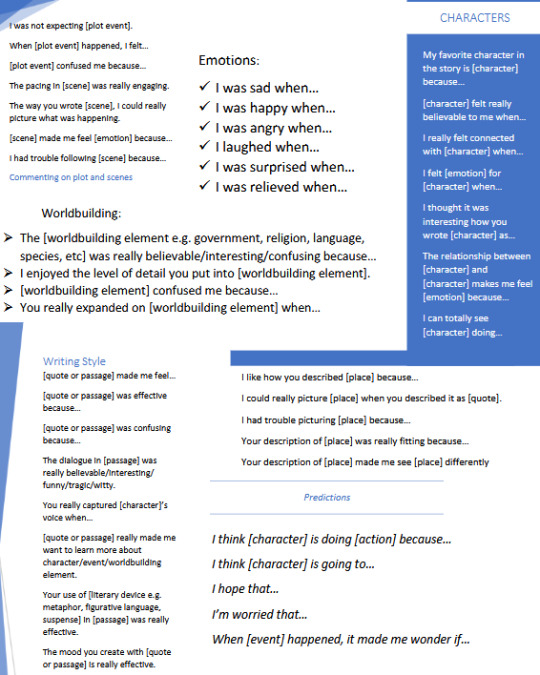
Add to this post with your own favorite resources!! Let's make a masterlist!!!
6 notes
·
View notes
Text




Hello everyone, today is my 29th birthday.
With that in mind, I figured it would be the best time to talk about this, so I'm proud to present to all of you 東方雷秘儀 ~ Strike in the Holy Apex, my very first Touhou Project fangame!
The game's story will be centered around a mysterious thunderstorm that's raiding the entirety of Gensokyo, so it's up to a group of heroines to investigate the situation and save the day.
As some of you may know, around November of last year, GameMaker has become free to use for everyone, which prompted me to take the opportunity to create an engine that looks roughly similar to ZUN's original Touhou Project games. I showcased it in greater detail on YouTube sometime around late February and I was very pleased by the generally positive feedback it got.
Taking that into account, I continued to expand the work I've done and it has grown a lot during the past four months; menus function properly, game settings can be modified, controller support has been added, several gameplay tweaks have been implemented, and so on. There's still a number of things that need to be ironed out by the time I'm writing this post, but considering the progress I have done on it so far, I have faith that a trial version for the game will be ready for release soon. This has to be the biggest project I've worked on... by a country mile. Speaking of the trial version's release date, that will be disclosed at the very end of this post.
GameMaker being free to use has given me a joy I genuinely can't describe, and I bet my inner child would’ve been happy too by hearing those news. After all, I've had experiences with GameMaker for well over 15 years, basically almost half of my entire life!
So, what should you expect by the time the trial version is released? First things first, it'll obviously consist of only three stages.
Secondly, you'll be able to play this adventure as the usual duo; Reimu and Marisa. More playable characters will be available in the full version.
Thirdly, the game's main mechanic. It's called the Brave Gauge, and it has functionality almost similar to the Season Gauge found in Touhou 16: Hidden Star in Four Seasons. It's not the most original idea I've had, but for the record, and coming back to my familiarity with GameMaker ever since my teenage years, this system was taken from a very old draft which dates all the way back to 2014, while making some adjustments to it. Here's a little bit of proof:

I'm going a bit off tangent here, but seeing these filenames kinda makes me feel embarrassed. The game has "Ascii" on the name because all of the graphics in there were made using ASCII characters, which was done during a time when my artistic talents were non-existent, so they looked quite messy and overall made the game have a goofy aura to it, haha.
And lastly, considering that I'd like this game to be played by a wider demographic, it's gonna be available in three different languages: English, Spanish (my native language, hooray!) and Japanese. These can be selected anytime via the options menu.
I don't know any people who are fluent in Japanese, and the few friends that I have don't seem to know much about the language either, so that translation is gonna be handled 100% by myself using tools like DeepL. I know that translating all the stuff in one go can lead to heavily mistranslated results, so I'll be making sure to convert my game's text as meticulously as I can. If there's anyone out there who understands Japanese fluently and is willing to translate the text for me, please hit me up because that'd be really appreciated. In case that happens, I won't be able to reward the translation financially, but I will be adding your name to my game's end credits.
So yeah, I don't have much else to say. The game's trial version will be available on Itch.io this August 30th.
The game has a long way ahead from being completed, so anticipating a release date for the full version is not feasible, at the moment. Regardless, I'll make sure to update on that once I have made abundant progress on it.
Both versions of the game will be released as pay-what-you-want. In simpler words, they'll be available free of charge with the optional choice of depositing a sum, in case you're feeling generous. After all, not to brag, but it goes without saying that I'm handling every detail in the game; not just the programming, but also the art, music and writing. While I have used some code libraries to facilitate the inclusion of certain aspects in my game, most of the heavy lifting is carried out by me, so it'd be really appreciated to have some compensation for the work I have been doing for almost half a year. It's not by any means mandatory, so it's fine if you can't for whatever reason, hahaha.
Anyway, I hope you look forward to this game of mine as much as I do! See you then!!
26 notes
·
View notes
Note
Hello. I am wondering why you start liking Takeomi. He is the most hated character by the fandom and your choice of wet soggy cat is very unique. I want to listen your ramblings.
Oh anon, if only I knew
I'll try to remember how it happened, that much I think I got it.
So, when I first got into TR, my mind mostly focused on Mitsuya and the Shiba (mostly Taiju), so much so that I ended up writing a lot more than I thought I ever will on Taiju and explaining where his behavior comes from
Because it seems like a lot of people missed some important information. And by doing that I was able to show them details they had missed (prove that I was right in previous posts where I didn't justified myself and basically got called a liar by someone in the notes which incredibly pissed me off-) and, although that doesn't excuse what Taiju did, it does explain it and makes him more.. real? Maybe not relatable, but his domestic abuse didn't pop up out of nowhere and a lot of people know what intergenerational trauma can do so while still hating Taiju they could understand him better.
Then, having finished my Taiju analysis which also opened my eyes since I found more than what I initially thought about; I myself was able to understand him better and so I thought-
Why not do that with every hated characters in the fandom?
I don't quite recall if my (at the time, very slight) interest in Takeomi happened a bit before or at that time, but the reason why I focused on him before the others (which, uh, aren't a lot anyway) was because I saw stuffs written about him which I didn't really agree with? Like, yeah, he was flawed and raised his siblings badly - especially when next to Shinichiro who was (at least depicted as)(and try to be) good at it - but they were kinda amplifying things
I know that a lot of people relate to Sanzu, or just, love him, and since they saw things I haven't seen, I told myself 'well, let's investigate, then' and then I wrote about 17k words on Takeomi's psychology.
I literally walked myself into the Takeomi rabbit-hole (what a FUCKING mistake /positive)
Takeomi did neglect his siblings, and passive-aggressively verbally, or even emotionally, abused Sanzu and for most of the fandom, is not attractive (and, let's not lie, beauty is a redeeming quality for a lot of characters regardless of fandom. How many characters, no matter their faults, get forgiven by fans just because they're hot, uh?). So he sucks, yeah
You know what he did do? acknowledged his mistakes, apologized for them and would have started his redemption arc if Wakui had had the time for that when warping up the story
He made mistakes, he's flawed, he's human, he wasn't even supposed to be here because he only entered the delinquent world to keep following Shinichiro, his ego which was back then very weak and non-existent got inflated for either survival or because he received so many compliments he didn't know what to do with it if not both because he was a k i d.
Most of the characters in TR are kids or young adults when they commit things they shouldn't have done. And yes, you can hold them accountable for it but they didn't know better - they didn't have the tools to
Now, why do I like Takeomi.
First of all - the amount of flaws he has. Don't think I need to make the list, I think everyone's got it (although make sure to remember he's got an inferiority complex and it's most likely that he also has an imposter syndrome so he's just like me fr-). But even with that, he's never an antagonist. He does things wrong but he's on our side (he's just very deaf to anyone's opinion that doesn't fit his). He sucked at raising his siblings as a kid himself (before his superiority complex developed and during it too - albeit in different ways) but that's just.. realistic? Not that it takes away the seriousness of it and the consequences, but how else could it have been? The impact on Sanzu were disastrous (not that they were the only reason why Sanzu lost it), I understand that, I don't erase that nor deny it BUT THERE'S A REASON WHY TAKEOMI IS LIKE THIS, TOO. And if people blame Takeomi for his actions (which, again, fair.) then blame Sanzu for his!! he was willing to mass murder hundreds of people!!! including his sister!!! he killed a few people!! argh. But Sanzu got his tragic-backstory/childhood shown and has a design that appeals to most, so I guess it's harder to hold him accountable for the seriousness of his actions (I like Sanzu, don't get me wrong. But sometimes the hypocrisy of some fans makes me a tiny bit angry 🙃)
Anyway, reason 84123286 of why I need Takeomi's backstory. Bc, honestly, from what we know of him as a kid+his coping mechanisms as a teen/adult, it would make sense to me if one of the reason he was so hostile to Sanzu was because he saw himself in him and Didn't Like ItTM (for different reasons) (!!! Which would add nicely to Shinichiro seeing himself in Mikey!!! more sano-akashi parallels, lets goooooooo) Talking about the parallels between the two, the fact he's Shinichiro's narrative foil compels me lots. Takeomi is quite literally Shinichiro with a negative filter on. And how can he survived that? How can he cope with the fact that no matter how much he wants and tries to be Shinichiro he'd never succeed? He'd always be the pale copy, the wood statue covered with golden leaves that are peeling away with time next to the pure gold statue. The Teru Teru Bozu that fails to chase the rain away and is going to be decapitated for his ineptitude. He'd always be himself and that's what he hates the most. He'd always be compared to Shinichiro and there's nothing he can do about it. And he can't even be angry at Shinichiro. That's his best friend. He loves him. He has been the first to love him. He has been there before anyone else. He can't lose Shinichiro, Shinichiro gave him everything. Everything he cares about, he sees value of, at least. Immaculate.
I'll also die on the hill that he is competent. He himself has no idea on what but he is (he mixes everything. For him it'd go like this: he gets praised but he's done nothing, Shinichiro has done everything which means they praised him for what Shinichiro has done. Which means what Shinichiro do, he does too. Which means Shinichiro's achievements are his as well! right? He didn't do anything by himself, there's no need to praise him for something else.)(he's fully blind that strategically-speaking and in other brainy-brain domains he's competent af. Bc since it comes 'easily' to him - since he doesn't struggle much with it, or in contrary he struggles so much he cannot possibly be good at it, then there's nothing to praise. And like, for him what Shinichiro does deserve to be praised. What he himself does is just.. things he does so compliments feel shallow)(+Bonten strives as much as Bad Toman and Manila if not more, yet there's no Kisaki. Ofc there's still Koko so that helps, but Takeomi is new to the team and got recruited (at least that what Senju said) in Brahman for his ~wisdom~)
He's also the only character who was around before Shinichiro 1) became a big brother 2) became a delinquent and that has to mean something. They're the only ones left to remember how the other was before their life went to shit
In the final timeline, he looks so healthy. He made peace with himself, his relationship with his siblings is good, he made amends. He healed, they healed. His relationship with Shinichiro, Benkei and Wakasa is good too everything's great. He learnt to understand what he is competent in and focus on it; he's not Shinichiro, he'll never be and that's okay. He's him and what he is complete Shinichiro just as Shinichiro complete him – they take care of one another's flaws but can also know live independently from each other. Perhaps, perhaps Takeomi stopped being so dependent of him
Appearance-wise, I love dark hair+green eyes combo in general so it wasn't that hard (plus there are some godly fanarts out there)
And of course: despite his complexity, at the end of the day - he's really just a pathetic wet poor excuse of a man who can't do anything right and isn't that endearing
I'm slowly getting out of the denial-phase to enter my acceptance-phase when it comes to loving Takeomi. Liking things most people hate or are neutral about is smth I hate for Reasons but it also seems to always happen lolololol. Will try to talk more about Takeomi when it comes to my mind, in case ppl who also love him but don't want to make it known because of his bad reputation in the fandom saw my posts and feel a bit more okay and comfortable with loving him
#sorry for not answering earlier yesterday was a lot busier than expected#funfact: 'cute' and 'pathetic' in japanese are basically the same word (its a bit more complicated than that but im not in the mood to#develop)#answering asks#the fandom situation isn't the same but — what i like about takeomi is the same thing i like about Toji in Jjk#they love their son/sibs they cant handle the responsibilities they have debts/flaws in quantity and the non-surprise id feel if it becomes#official Takeomi is the black sheep of his family#theyre emotionally avoidant they can't show their love their n1 coping mechanisms is avoidance etc etc
21 notes
·
View notes